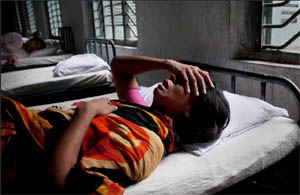The Pabna Mental Hospital is the first research site for DU’s theater and performance studies students
Health Desk : dhakamirror.com
A group of theater and performance studies students from Dhaka University began conducting research at Pabna Mental Hospital, on the use of ‘culture therapy’ to treat patients with mental illness.
Five departmental students — Fazle Navid Onon, Tanvir Newaz Tirtho, Jannatul Mawa Nibir, Farzana Afrin Meem, and Shithi Ishra Risil — conducted field research among hospital patients and medical personnel over the course of the last two days.
“Many of the mentally ill people we spoke with have an extraordinary ability to expose themselves. In addition to traditional medicine, they also need cultural therapy to help them enjoy life. Cultural therapy can help a mental patient in this way,” said Fazle Navid Onon, a member of the research team.
He explained that theoretically, cultural therapy is divided into three categories: “art therapy,” “drama therapy,” and “music therapy.”
“Different patients have various preferences. Some patients enjoy drama and painting, while others enjoy music. Before working with a patient, we must first determine what is appropriate for that patient,” said another team member Jannatul Mawa.
“The majority of the patients we spoke with and tried to implement these three methods with during our visit to the mental hospitals in Pabna had positive responses, so we are optimistic that the cultural therapy will be successful for mental patients,” she added.
“We have already gathered patient histories and followed their medical care before deciding to start therapy,” said Tanvir Newaz, adding that the initiative will be more successful if it takes on an organisational structure.
Students began their study project under the direction of departmental teacher Professor Dr. Ishrafil Shahin to apply “culture therapy” for providing care to mental patients.
However, Dr. Safkat Wahid, the director of Pabna Mental Hospital said that if ‘culture therapy’ can be effectively executed, it will be a significant advancement in the treatment of mental patients, but it should be applied domestically.

